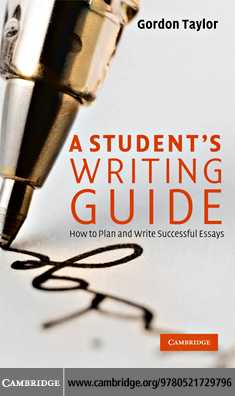
This page intentionally left blank
A Student’s Writing Guide
Are you struggling to meet your coursework deadlines? Finding it
hard to get to grips with your essay topics? Does your writing
sometimes lack structure and style? Would you like to improve your
grades? This text covers everything a student needs to know about
writing essays and papers in the humanities and social sciences.
Starting from the common difficulties students face, it gives practical
examples of all the stages necessary to produce a good piece of
academic work:
r interpreting assignment topics
r drawing on your own experience and background
r reading analytically and taking efficient notes
r developing your argument through introductions, middles
and conclusions
r evaluating and using online resources
r understanding the conventions of academic culture
r honing your ideas into clear, vigorous English.
This book will provide you with all the tools and insights
you need to write confident, convincing essays and coursework
papers.
g o r d o n t a y l o r is Honorary Research Associate at Monash
University; before his retirement he was Associate Professor and
Director of the Language and Learning Unit in the Faculty of Arts
there. He was a pioneer in the development of content- and
discipline-specific writing programmes for students in higher
education. His many publications include The Student’s Writing
Guide for the Arts and Social Sciences (1989).

A Student’s
Writing Guide
How to Plan and Write Successful Essays
GORDON TAYLOR
CAMBRIDGE UNIVERSITY PRESS
Cambridge, New York, Melbourne, Madrid, Cape Town, Singapore, São Paulo
Cambridge University Press
The Edinburgh Building, Cambridge CB2 8RU, UK
Published in the United States of America by Cambridge University Press, New York
Information on this title: www.cambridge.org/9780521729796
© Cambridge University Press 2009
This publication is in copyright. Subject to statutory exception and to the provision of relevant collective licensing agreements, no reproduction of any part may take place without the written permission of Cambridge University Press.
 Gordon Taylor
Gordon Taylor